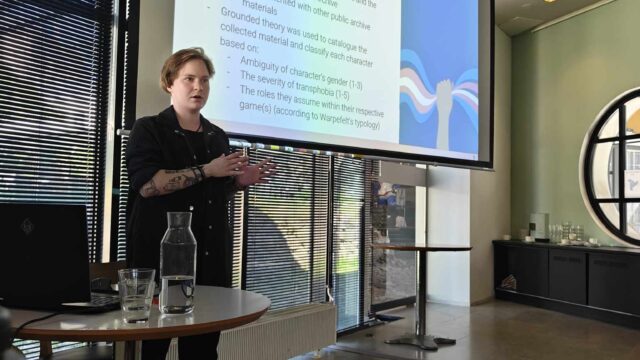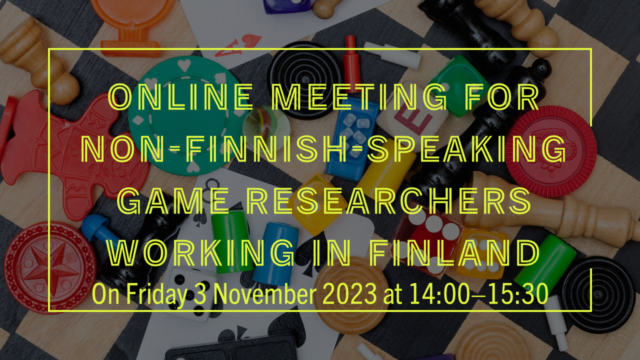Cover photo: Joona Wiik, winner of the master’s thesis series in the game studies thesis competition, at Finnish Game Studies Day 2024. Photo by Haron Walliander.
Suomeksi
Suomen pelitutkimuksen seura ja Neogames Finland ovat myöntäneet vuoden 2024 pelialan opinnäytetyökilpailun palkinnot Joona Wiikille Turun yliopistosta ja Christina Piiraiselle Humanistisesta ammattikorkeakoulusta. Lisäksi kunniamaininnan sai Teodora Mansikkamäki Tampereen yliopistosta.
Palkintoraati haluaa kiittää kilpailutöiden tekijöitä ja ohjaajia, ja kannustaa kaikkia pelialalla opiskelevia rohkeasti avartamaan ymmärryksemme ja pelitutkimuksen rajoja.
Pelialan opinnäytetyökilpailu tuo vuosittain näkyviin sen, miten monipuolista ja näkemyksellistä työtä oppilaitoksissa ympäri maata tehdään. Tänäkin vuonna työt vaihtelivat teoreettisesta käytännölliseen, henkilökohtaisesta yhteiskunnalliseen ja taiteellisesta tekniseen. Sanalla sanoen kilpailutyöt olivat elävä esimerkki siitä, miten moniulotteista osaamista pelialan koulutus tuottaa, ja miten monet tieteenalat ja ammattiryhmät pelialaan kytkeytyvät. Hyvin tehty opinnäytetyö toimii myös tekijänsä käyntikorttina työelämään siirryttäessä tai johtaa suoraan kiinnostavien jatkotutkimushaasteiden äärelle.
”Pelialalla, niin kuin yhteiskunnassamme laajemminkin, on jo pitkään tunnistettu diversiteetin merkitys, niin pelien kehittäjien kuin myös pelaajien joukossa. Inklusiivisuuden edistämiseksi voidaan kuitenkin tehdä vielä paljon. Tieto ja stereotypioiden aukikirjoittaminen tukevat näitä tavoitteita olennaisesti. Molemmat tämän vuotiset opinnäytetyökilpailun voittajat käsittelevät näitä aiheita omista kulmistaan”, Neogames Finlandin edustaja Suvi Latva kommentoi voittajatöitä.
Joona Wiik (Turun yliopisto) voitti yliopistosarjan työllään Violence, Sexualization, and Otherness: An Analysis on the Representation of Transgender Characters in Video Games. Tutkielmassa analysoidaan ajankohtaista ja haastavaa aihetta, kunnianhimoisena pyrkimyksenä kattaa representaatioiden ja stereotypioiden luonteet ja kehitys 1980-luvun lopulta nykyaikaan. Tekstistä välittyvät aito paneutuminen aiheeseen ja niin tutkimuskirjallisuuden kuin tutkimusmateriaalinkin laaja tuntemus. Raati arvosti myös sitä, että analyysin tulosten todenmukaisuutta ja tutkimuksen rajoitteita on arvioitu rehellisesti. Hyvin kuvitettu ja selkeää grafiikkaa käyttävä työ on liitteineen aiheensa perusteos, josta riittää ammennettavaa myös tuleviin tutkimuksiin. Analyysillä on selkeä yhteenveto, joka esittelee pelien transsukupuolisuusesitysten stereotypiat niin akateemisesta kuin yhteiskunnallisestakin näkökulmasta.
Työ on avoimesti saatavilla osoitteessa https://www.utupub.fi/handle/10024/176174
Christina Piirainen (Humanistinen ammattikorkeakoulu) voitti AMK-sarjan työllään Moninaisempi pelitapahtuma: kehityskohteet Assembly-tapahtumissa naisten ja sukupuolivähemmistöjen näkökulmasta. Opinnäytetyössä kartoitetaan pelaavien naisten ja sukupuolivähemmistöihin kuuluvien henkilöiden kiinnostusta, mielikuvia ja esteitä tapahtumiin osallistumista. Aineistona on kiitettävän monipuolinen kysely-, haastattelu- ja työpaja-aineisto. Aihe on selkeästi rajattu ja sen haasteet tunnistettu. Selvityksessä pohditaan konkreettisia ratkaisumahdollisuuksia ja avataan realistisia toteutustapoja parantaa kohderyhmien osallistumista tulevissa tapahtumissa. Palkintoraati piti työtä tärkeänä ja rakentavana tutkimuksena syrjimättömän pelaajakulttuurin vahvistamisessa pelitapahtumien piirissä.
Työ on avoimesti saatavilla osoitteessa https://www.theseus.fi/handle/10024/810717
Tällä kertaa palkintoraati päätti myöntää myös yhden kunniamaininnan.
Kunniamaininta yliopistosarjassa myönnettiin Teodora Mansikkamäen (Tampereen yliopisto) työlle Take me to your leader: A deep dive into leader roles in World of Warcraft raiding guilds. Työ käsittelee kiltajohtajien toimintaa, arvoja ja suhdetta toimintaansa sujuvasti. Taustoitus on laaja ja teoreettista kunnianhimoa ja läsnäoloa on hyvin suhteessa siihen, että kysymyksenasettelu ja aiheen käsittely pohjautuvat haastattelumateriaaliin analyysiin. Johtopäätökset on esitetty selkeästi ja teksti onnistuu herättämään sekä käytännöllisiä että teoreettisia kysymyksiä lukijassaan. Palkintoraati arvosti sitä, että tekijä reflektoi omaa kiltajohtajatoimintaansa läpinäkyvästi ja pystyi huomioimaan sen onnistuneesti käsittelyssään.
Työ on avoimesti saatavilla osoitteessa https://trepo.tuni.fi/handle/10024/147665
Pelialan vuosittaiset opinnäytepalkinnot jaettiin kahdettatoista kertaa. Opinnäytekilpailu nostaa vuosittain esiin uusia näkökulmia ja lähestymistapoja pelialalla tehtävään tutkimukseen ja koulutukseen. Palkinnon jakavat yhteistyössä Suomen pelitutkimuksen seura sekä suomalaisen pelialan kattojärjestö Neogames Finland. Kilpailuun osallistui kaksikymmentäkaksi korkeatasoista työtä eri oppiaineista ja tieteenaloilta yliopistoista ja ammattikorkeakouluista ympäri Suomen.
Yhteystiedot: Lisätietoja kilpailusta antaa raadin puheenjohtaja, yliopistonlehtori Derek Fewster (derek.fewster@helsinki.fi).
In English
The Finnish Society for Game Research and Neogames Finland have awarded the prizes of the 2024 Game studies thesis competition to Joona Wiik from the University of Turku and Christina Piirainen from the Humak University of Applied Sciences. Teodora Mansikkamäki from Tampere University also received an honorary mention in the competition.
The award jury would like to thank the authors and supervisors of all the submitted works and encourages all those working in the fields of Game studies to boldly expand the boundaries of our understanding and the future of game research. The Game studies thesis competition brings to light every year how varied and visionary work is done in educational institutions around the country. This year too, the works ranged from theoretical to practical, from personal to social and from artistic to technical. In a word, the competition entries were an excellent example of how much multidimensional competence the education related to the gaming industry produces, and how many disciplines and professional groups are connected to game research. Every well-done thesis also serves as the author’s business card when moving into working life or leads directly to interesting further research challenges.
”In the gaming sector, as in our wider society, the importance of diversity has long been recognized, both among game developers and players. However, much can still be done to promote inclusiveness. Critical research and deconstruction of stereotypes essentially support these goals. Both the winners of this year’s thesis competition deal with such topics, from their own angles,” Suvi Latva from Neogames Finland comments on the awarded theses.
Joona Wiik (University of Turku) won the university series with his work Violence, Sexualization, and Otherness: An Analysis on the Representation of Transgender Characters in Video Games. The thesis analyzes a current and challenging topic, and is an ambitious effort to cover the nature and development of transgender representations and stereotypes from the late 1980s to the present day. The text conveys genuine focus on the topic and extensive knowledge of both research literature and research material. The jury also appreciated that the truthfulness of the results of the analysis and the limitations of the research have been honestly assessed. The work, which is well-illustrated and uses clear graphics, is a basic work on its subject with its appendices, from which there is plenty to draw from for future studies as well. The thesis has a clear summary that presents the stereotypes of transgender representations in games from both an academic and societal perspective.
The work is openly available at https://www.utupub.fi/handle/10024/176174
Christina Piirainen (Humak University of Applied Sciences) won the applied sciences series with her work Moninaisempi pelitapahtuma: kehityskohteet Assembly-tapahtumissa naisten ja sukupuolivähemmistöjen näkökulmasta (A more diverse gaming event: development targets in Assembly events from the perspective of women and gender minorities). The thesis maps the interest, images, and obstacles of women and persons belonging to gender minorities who play and participate in the events. The material is commendably versatile and includes survey, interview, and workshop materials. The topic is clearly defined, and its challenges identified. The work proposes actual solution possibilities and opens realistic implementation methods to improve the participation of target groups in future events. The award jury considered the work as important and constructive research in strengthening a non-discriminatory player culture within the scope of gaming events.
The work is openly available at https://www.theseus.fi/handle/10024/810717
This time, the award jury also decided to award one honorable mention. This was awarded in the university series to Teodora Mansikkamäki’s (Tampere University) work Take me to your leader: A deep dive into leader roles in World of Warcraft raiding guilds. The thesis deals with the activities, values and relationships of the guild leaders in a fluent way. The background is extensive, and the presented theoretical ambition and presence works well in proportion to the fact that the questioning and treatment of the topic are based on the analysis of the interview material. The conclusions are presented clearly, and the text manages to raise both practical and theoretical questions in its reader. The award jury appreciated the fact that the author reflected on her own guild leader activities in a transparent way and was able to successfully take this experience into account in the study.
The work is openly available at https://trepo.tuni.fi/handle/10024/147665
The annual thesis awards in the gaming sector have been awarded twelve times. The thesis competition highlights new perspectives and approaches to research and education in the gaming industry every year. The award is presented jointly by the Finnish Society for Game Research and Neogames Finland, the umbrella organization of the Finnish game industry. Twenty-two high-level works from different subjects and disciplines from universities and colleges of applied sciences all over Finland participated in the competition.
Contact Information: For further information, please contact the chair of the evaluation committee, University Lecturer Derek Fewster (derek.fewster@helsinki.fi).



